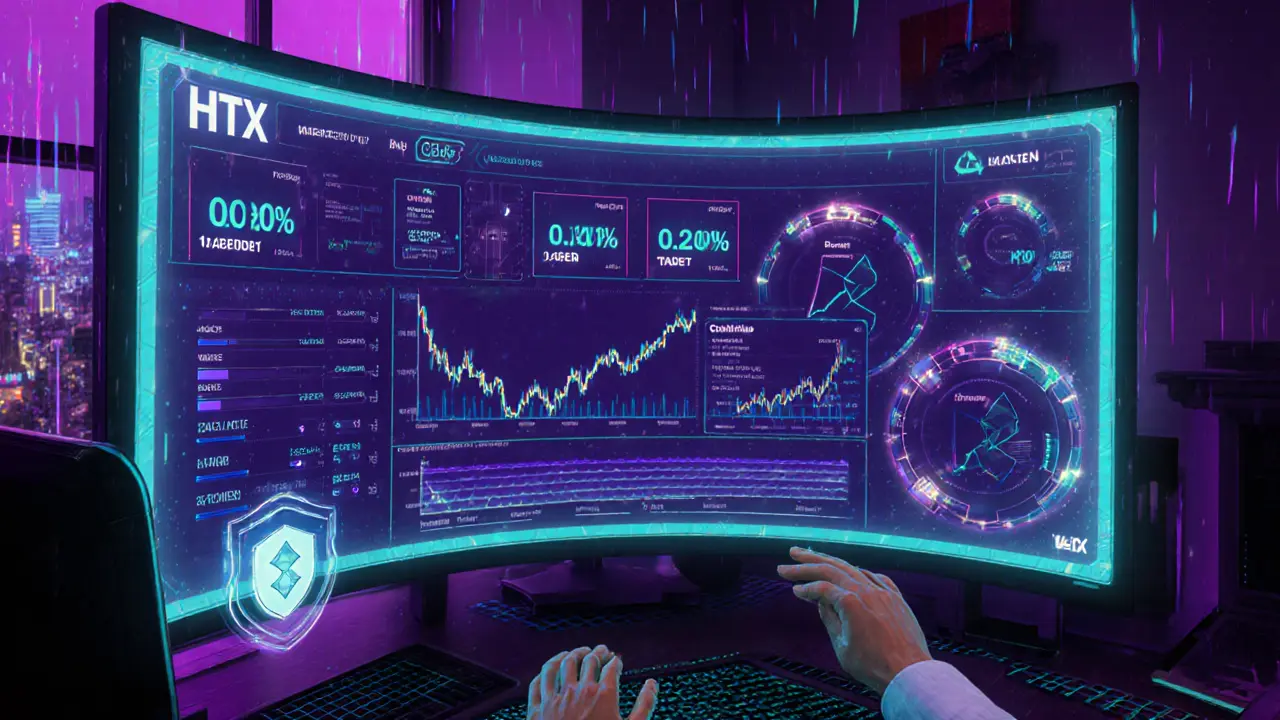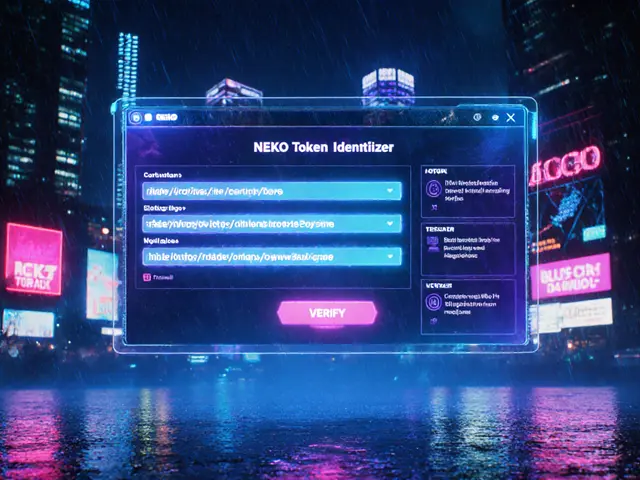HTX Argentina Compatibility Checker
Compatibility Analysis
When Argentine traders start hunting for a reliable crypto platform, the first question is usually: Huobi Argentina actually works here. This review breaks down everything you need to know - from availability and fees to security and local alternatives - so you can decide whether the rebranded HTX exchange fits your needs.
TL;DR - Quick Takeaways
- HTX (formerly Huobi) operates in over 160 countries, but official documentation does not list Argentina as a supported jurisdiction.
- Spot‑trading fees start at 0.2% for makers, dropping to 0.0126% for VIP users.
- Security includes cold‑storage, Merkle‑tree proof of reserves, and a history of transparent breach compensation.
- Platform offers 700+ assets, staking, crypto loans, OTC, and copy‑trading.
- Local payment options for Argentine pesos are uncertain; you may need to rely on international bank transfers or credit‑card purchases.
Who Is Behind HTX?
Huobi is a crypto exchange founded in 2013 by Leon Li, a former Oracle engineer from Tsinghua University, and Jun Du in Beijing, China. In September 2023 the brand was refreshed as HTX to celebrate its 10‑year anniversary. Today the headquarters sit in the Seychelles, and the platform serves more than 47million registered users worldwide.
Is HTX Available in Argentina?
The official list of restricted jurisdictions includes the United States, China, Cuba, Iran, North Korea, Sudan, Syria, Venezuela, Hong Kong and Singapore. Argentina is not explicitly mentioned, which leaves a gray area. In practice, Argentine users have reported mixed experiences:
- Some users can create an account using a passport and a foreign‑issued email address, but the KYC flow asks for a national ID that the platform does not always recognize.
- Local payment methods (banktransfer in ARS, PIX‑style services) are not listed among the 57 supported fiat currencies, so most traders rely on US‑based debit/credit cards or third‑party bridges (e.g., Wise, PayPal) to fund the account.
- Customer support in Spanish exists, but response times can be longer than for regions where HTX has a dedicated office.
Bottom line: technically you can sign up, but expect extra friction and the need for an international payment channel.
Key Features for Argentine Traders
Even if you overcome the onboarding hurdles, HTX packs a lot of tools that matter to both beginners and seasoned traders.
- Spot trading: Over 700 digital assets and 1,000+ pairs, including major coins like Bitcoin and Ethereum.
- Staking and Yield: Earn up to 12% APY on selected tokens directly from the wallet.
- OTC desk: Enables large‑volume trades with minimal slippage, useful for institutional investors.
- Crypto loans: Borrow USD‑denominated stablecoins against crypto collateral.
- Copy‑trading: Follow top performers and replicate their strategies with a single click.
- Advanced order types: Limit, market, stop‑limit, iceberg, and TWAP orders.
Fee Structure - How Much Does Trading Cost?
HTX follows a maker‑taker model that is competitive for a large exchange. The table below outlines the basic fee schedule and how it compares to two other popular platforms, Binance and Kraken.
| Exchange | Maker fee | Taker fee | Lowest possible fee (VIP tier) |
|---|---|---|---|
| HTX (Huobi) | 0.20% | 0.20% | 0.0126% (VIP9) |
| Binance | 0.10% | 0.10% | 0.00% (VIP9) |
| Kraken | 0.16% | 0.26% | 0.00% (VIP4) |
While Binance still offers lower baseline fees, HTX compensates with a richer suite of services and a solid reputation for handling high‑volume traffic without downtime.
Security Overview - Can You Trust Your Funds?
Security is a make‑or‑break factor for any exchange. HTX implements several layers of protection:
- Cold storage: Approximately 95% of user assets are kept offline.
- Merkle‑tree proof of reserves: Publicly auditable snapshots that verify the exchange holds the claimed amount of crypto.
- Two‑factor authentication (2FA) via Google Authenticator or SMS.
- IP whitelist for withdrawals, adding an extra barrier for hackers.
The platform has experienced a few breaches in its early years, but each incident was followed by public disclosures and, where applicable, compensation to affected users. This transparent approach has helped maintain user confidence.

Regulatory Stance - How Does HTX Align with Argentine Law?
Argentina’s crypto regulatory environment is still evolving. While the government has not banned crypto trading, it imposes strict foreign‑exchange controls and requires reporting of large transactions. HTX has publicly announced its effort to comply with the EU’s MiCA (Markets in Crypto‑Assets) framework, suggesting a willingness to meet robust compliance standards.
For Argentine users, the practical implications are:
- Potential need to declare crypto holdings for tax purposes.
- Possible friction when converting ARS to USD or other fiat through the platform, due to local capital‑control policies.
- Limited local legal recourse if the exchange were to freeze assets, meaning you should keep only what you’re comfortable leaving on an offshore platform.
Pros and Cons - Quick Verdict
| Pros | Cons |
|---|---|
| Large asset selection (>700 coins) | Unclear local fiat support - ARS not listed |
| Competitive tiered fee structure | KYC may reject Argentine ID documents |
| Robust security (cold storage, proof of reserves) | Customer support latency in Spanish |
| Advanced tools (copy‑trading, OTC, loans) | Regulatory uncertainty - no explicit Argentine licensing |
| Active development - new token launches (e.g., TRUMP, LAYER) | Past security breaches, though compensated |
How to Get Started - Step‑by‑Step Guide
- Visit the official HTX website (htx.com) and click “Sign Up”.
- Enter your email and create a strong password. Verify the email link.
- Complete KYC: upload passport, a selfie, and proof of residence. If your Argentine ID isn’t accepted, try using a passport.
- Enable 2FA for added security.
- Deposit funds: choose “Bank Transfer (International)” or a supported credit card. Convert ARS to USD via a local exchange (e.g., Ripio) before sending.
- Navigate to the “Buy Crypto” tab, select the coin, input the amount, and confirm.
- Optional - Join the “HTX DAO” community to earn rewards for governance participation.
Keep an eye on the “Announcements” page; HTX often publishes updates about new fiat gateways or regional partnerships.
Alternative Exchanges for Argentine Users
If the friction with HTX feels too high, consider these locally‑friendly platforms that support ARS directly:
- Binance - Offers ARS deposits via local partners, low fees, and a massive user base.
- Ripio - An Argentine broker with a built‑in exchange, fully compliant with local regulations.
- OKX - Supports credit‑card purchases in Argentine pesos and has a Spanish‑language help center.
Each alternative comes with its own fee schedule and security profile, so weigh them against the features HTX provides.
What to Watch Out for - Common Pitfalls
- Currency conversion costs: Using a third‑party bridge can add 1‑3% hidden fees.
- Withdrawal limits: New accounts may face lower daily caps until verification levels are increased.
- Regulatory changes: Argentina could tighten crypto rules, affecting offshore exchanges.
- Network congestion: During high‑traffic periods, order execution may slow, especially for less‑liquid pairs.
Bottom Line - Should Argentine Traders Use HTX?
If you value a wide asset list, advanced trading tools, and are comfortable navigating international payment routes, HTX can be a solid choice. However, the lack of direct ARS support and occasional KYC hiccups mean you should keep only a modest amount on the platform until you confirm smooth operation.
Frequently Asked Questions
Is Huobi (HTX) officially available in Argentina?
Officially, Argentina is not listed among the restricted jurisdictions, so the platform can be accessed. In practice, users often face KYC challenges and must rely on international payment methods, as ARS is not a supported fiat.
What are the basic trading fees on HTX?
Both maker and taker fees start at 0.20% for standard accounts. By moving up the tier system (based on 30‑day trading volume or HT token holdings), the maker fee can drop to as low as 0.0126%.
Can I deposit Argentine pesos directly?
No. HTX lists 57 fiat currencies, but ARS is not among them. Users typically convert pesos to USD or EUR via a local broker and then use an international bank transfer or credit card to fund the HTX account.
Is my money safe on HTX?
HTX stores the majority of assets in cold storage, publishes Merkle‑tree proof of reserves, and offers 2FA and IP‑whitelist for withdrawals. Past security incidents were publicly disclosed and compensated, indicating a proactive stance.
What are good alternatives if HTX feels too complicated?
Binance, Ripio, and OKX all support ARS deposits and have Spanish‑language support. They may lack some of HTX’s niche products (e.g., crypto loans), but they provide smoother onboarding for Argentine residents.








Comments
22 Comments
Aditya Raj Gontia
The HTX fee tier looks superficially competitive, yet the underlying tokenomics lack substantive depth.
Kailey Shelton
Seems like a decent platform, but the ARS support is missing.
Angela Yeager
For anyone looking into HTX from Argentina, start by confirming that you can actually complete the KYC using a passport rather than a local ID. Once verified, enable 2‑FA to protect your account, and consider moving the bulk of your holdings to cold storage after trading. The fee structure is tiered, so if you plan to trade heavily you’ll eventually see the maker fee drop dramatically, but the base 0.2% is still higher than on Binance. Security-wise the platform uses cold storage for roughly 95% of assets and publishes Merkle‑tree proofs, which is a solid transparency measure. Keep in mind that ARS isn’t a supported fiat, so you’ll need to convert pesos to USD via a broker like Ripio before depositing. International credit‑card deposits tend to incur 1‑3% hidden fees, so factor that into your cost calculations. Customer support in Spanish does exist, but response times can be sluggish compared to regions with local offices. If you’re a high‑volume trader, the OTC desk can help you avoid slippage on large orders. Finally, always stay aware of Argentine capital‑control regulations and tax reporting requirements when moving crypto in and out of the country.
vipin kumar
All that official‑sounding security can’t hide the fact that an offshore exchange like HTX still sits outside any meaningful Argentine oversight, meaning your data and funds could be vulnerable to foreign jurisdictional seizures.
Lara Cocchetti
Using a platform that isn’t explicitly licensed in your home country feels morally ambiguous; we should demand that services handling our money be accountable to local consumer protections.
kishan kumar
From a metaphysical standpoint, the convergence of decentralized finance and centralized exchange architecture epitomizes a dialectic tension between autonomy and custodial authority; HTX, as a case study, illustrates this paradox with its hybrid model of on‑chain liquidity and off‑chain KYC enforcement.
Anthony R
HTX provides a wide range of assets, offers spot and margin trading, and includes advanced order types, such as iceberg and TWAP, which empower users to execute sophisticated strategies, yet the platform’s documentation could benefit from clearer explanations, especially regarding fee calculations and withdrawal limits.
Vaishnavi Singh
While the platform’s toolset is extensive, the lack of direct ARS integration remains a practical hurdle for many local traders.
Linda Welch
Oh great, another "global" exchange that pretends to care about us Argentinian crypto fans while conveniently forgetting to list our peso as a supported fiat, because apparently the world’s financial elite can’t be bothered with a country that’s been battling inflation for years. They brag about 700+ tokens and fancy copy‑trading, yet the moment you try to fund your account you’re forced to jump through hoops-convert to dollars on a third‑party broker, endure hidden fees, and hope the KYC doesn’t reject your passport because their system can’t recognize a South American ID. Customer support in Spanish? Sure, if you have the patience of a saint; responses can take days, and you’ll be left staring at a generic ticket number. Security sounds impressive with cold storage and Merkle proofs, but those past breaches remind us that no exchange is immune. The fee schedule may look competitive on paper, but for a small‑scale trader the 0.2% flat rate quickly eats into thin margins. If you’re a high‑volume player who can afford international transfers, maybe it’s worth the hassle, but for the average Argentinian trying to dip a toe into crypto, the friction alone feels like a barrier designed to keep us out. Bottom line: HTX is a shiny toolbelt for the privileged, not a user‑friendly gateway for everyday locals.
Kevin Fellows
Give it a try, you might surprise yourself!
meredith farmer
The drama surrounding HTX’s ambiguous status in Argentina is almost theatrical, a real‑life thriller where every new update feels like the next act. First, we get the promise of “global access,” then the twist: KYC may reject your passport, leaving you in a suspenseful limbo. Suddenly, the plot thickens with the revelation that ARS isn’t even on the list of supported currencies – a cliffhanger that forces you to seek shadowy third‑party bridges, each with its own hidden fees. The protagonists-traders trying to navigate this maze-are constantly haunted by the specter of long‑waiting Spanish support tickets. Meanwhile, the antagonists-regulators and offshore jurisdictions-remain faceless, their motives obscure. If the exchange were a character, it would be the charming rogue who looks trustworthy until you realize the stakes are higher than you imagined. In short, the whole saga feels engineered to keep us on edge, questioning whether any resolution is truly possible.
Peter Johansson
Stick with platforms that have solid local support; you’ll save time and stress 😊.
Kyle Hidding
The HTX offering is fundamentally a rebranded liquidity aggregator masquerading as a user‑centric exchange, but beneath the veneer lies a revenue model predicated on extracting spreads from inexperienced traders. Their “advanced” features are nothing more than a veneer to justify higher fees, and the purported security measures are industry‑standard at best. In short, it’s a classic case of hype over substance, and anyone buying into the narrative should be wary of the inevitable downside.
Andrea Tan
It’s interesting to see how these big exchanges try to adapt to local markets, even if the process feels a bit clunky.
Gaurav Gautam
Keep your eyes on the big picture: the more you diversify your exchanges, the less risk you face from any single platform’s hiccups.
Robert Eliason
i think u cant trst a platform that doesnt list its own country on its support page, its sus af and maybe a trap for ppl wnting to trade
Cody Harrington
That makes sense, I’ll look into a couple of alternatives before committing.
Fiona Chow
Is HTX really the best option for Argentine users, or are we just being sold a polished marketing narrative?
Rebecca Stowe
It’s worth a shot; you never know until you try.
Ayaz Mudarris
When evaluating HTX from a rigorous analytical perspective, several dimensions merit systematic examination. Firstly, the platform’s fee architecture employs a maker‑taker model with a baseline of 0.20% for both sides, yet it offers a descending tiered schedule predicated upon thirty‑day trading volume and HT token holdings, culminating in a minimal 0.0126% maker fee for elite participants. Secondly, liquidity provision is underpinned by a network of market‑making entities that collectively sustain order‑book depth across over seven hundred listed assets, thereby mitigating slippage even under adverse market conditions. Thirdly, security protocols encompass multi‑signature custodial controls, air‑gapped cold storage for the majority of assets, and regular Merkle‑tree proof of reserves, which collectively enhance transparency and resilience against external threats. Fourthly, regulatory compliance is signaled by the exchange’s public adherence to the European Union’s MiCA framework, suggesting a proactive stance toward evolving legal standards, though the absence of explicit Argentine licensing introduces jurisdictional ambiguity. Fifthly, user experience considerations reveal a comprehensive suite of advanced order types-including iceberg, TWAP, and conditional triggers-augmented by copy‑trading functionalities, thereby appealing to both algorithmic strategists and novice participants seeking guided exposure. Sixthly, the platform’s ancillary services, such as staking, crypto‑backed loans, and an OTC desk, diversify revenue streams and provide additional utility. Seventhly, operational reliability is evidenced by a historical uptime exceeding 99.9%, a critical factor for traders operating in volatile environments. Eighthly, the customer support infrastructure offers multilingual assistance with a noted latency for Spanish‑speaking inquiries, a factor that may affect time‑sensitive resolutions. Ninthly, the integration of third‑party fiat on‑ramps remains limited, as Argentine pesos are not directly supported, necessitating the use of international transfers or credit‑card intermediaries, which incurs ancillary costs. Tenthly, the ecosystem’s community governance via the HTX DAO incentivizes stakeholder participation through token‑based voting mechanisms. In synthesis, HTX presents a robust, feature‑rich proposition for sophisticated traders, yet Argentine users must weigh the operational frictions, regulatory opacity, and fiat conversion overhead against the platform’s technical merits.
Irene Tien MD MSc
Ah, the grand illusion of “global accessibility” – a phrase tossed around like confetti at a birthday party, yet when you dig deeper you find that Argentina is left hanging in a bureaucratic limbo. The platform boasts a dazzling array of 700+ tokens, but the moment you try to fund your account you’re forced into a labyrinth of third‑party bridges that siphon off 1‑3% in hidden fees, all while the KYC system occasionally decides your passport looks suspicious. Their security spiel-cold storage, Merkle proofs, two‑factor authentication-sounds impressive, but remember the early‑year breaches that required public compensation; a reminder that no fortress is impenetrable. Meanwhile, the fee schedule, though nominally competitive at the high‑volume end, still imposes a flat 0.2% for the average user, which can erode profits on thin‑margin trades. Add to that the sluggish Spanish support, the lack of ARS as a fiat option, and the regulatory gray zone where Argentine authorities could, theoretically, clamp down on offshore exchanges without warning. In short, HTX is the sleek sports car that looks great on the showroom floor but requires a premium on‑ramp, a mastery of foreign payment channels, and a generous tolerance for administrative hassle. If you enjoy navigating bureaucratic mazes for the sake of having a “global” exchange badge, go ahead; otherwise, consider more locally‑tailored alternatives that actually speak your language and accept your currency.
sandi khardani
The whole HTX proposition is a textbook example of overpromising and underdelivering, masquerading as a sophisticated trading hub while ignoring the practical needs of Argentine users. Their fee model, though tiered, remains bluntly high for anyone not trading massive volumes, effectively penalizing the very demographic that could benefit most from low‑cost access. Security claims are routinely plastered across marketing materials, yet past incidents reveal that even so‑called “cold storage” solutions can be compromised, and users are left to chase compensation after the fact. Moreover, the platform’s insistence on using foreign payment rails creates an unnecessary friction layer, inflating costs and exposing traders to exchange‑rate volatility. Customer service in Spanish is a nice gesture, but response times often lag, leaving users stranded during time‑sensitive market moves. Ultimately, HTX’s approach feels like a half‑baked attempt to capture the Argentine market without genuine localization, making it a risky choice for anyone seeking reliable, low‑friction crypto trading.
Write a comment